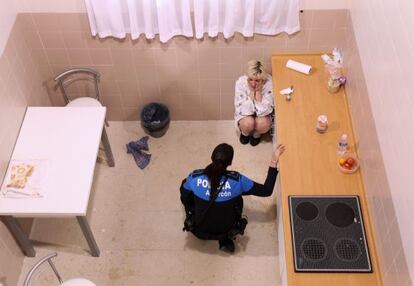Legal battle against gender violence still hampered by prejudice, says Amnesty
Spanish system undermining protection of victims, says NGO


Amnesty International (AI) has accused the Spanish legal system of undermining the protection of gender violence victims who have gone to court to seek restraining orders against their partners.
Among the shortcomings identified by the human rights organization are continuous prejudice in many cases, important oversights in investigations, and a lack of adequate information from the courts to inform citizens of their rights.
"There are many obstacles that keep people from seeking justice and protection," said Virginia Álvarez, in charge of public policy at Spain's AI chapter.
One such case involved a 31-year-old woman named Grace who is from Nigeria. A gender violence victim, Grace, who doesn't speak Spanish, was not afforded an interpreter when she went to the authorities to file a complaint.
In another case, Caren (not her real name), an Ecuadorian, was deported even though she had filed a complaint against her partner and under Spanish law she should have not been expelled while the case was pending a judicial decision.
Such incidents are outlined in a new report released by AI entitled "When Justice Also Deals Blows." The document criticizes "the holes" that still exist in the country's legal system when it comes to offering protection to gender violence victims. Under a 2005 anti-gender violence law, specialized courts were established and victims to be afforded free legal aid.
However, AI says that there are not enough lawyers to go around, and those that are available do not have the specialized training when it comes to dealing with such laws.
"There have been cases where lawyers have committed some serious errors, such as not appealing a stay of proceedings, or failing to present evidence that is readily available," says the coordinator of the report, María Naredo.
The document also details one instance of a woman who waited eight hours at police headquarters for her lawyer to show up. He didn't tell her that she should go to a women's shelter so instead the victim returned home to her violent partner.
Dropped cases
According to the Health Ministry, 60 women were killed by their partners or former partners during 2011. As of November 24, the figure for this year stood at 43.
"It is troubling but if the victims don't present enough evidence to support their complaints, a lot of the cases are dropped, even without carrying out a court investigation," Naredo said.
Lawyer Consuelo Abril, who is a member of the anti-gender violence NGO Malos Tratos, argues that the 2005 law was innovative and far-reaching "but the measures are not sufficient."
"There is still so much to do," she says.
While she believes that the legal system is much more effective and quicker than it was before the law was passed, Inmaculada Montalbán, president of the gender violence observatory at the General Council of the Judiciary (CGPJ), believes that more training is needed for lawyers, judges and psychologists. "We cannot forget that with the advances in the law, there has also been a lot of resistance. One of them is to minimize a woman's credibility," she says.
Tu suscripción se está usando en otro dispositivo
¿Quieres añadir otro usuario a tu suscripción?
Si continúas leyendo en este dispositivo, no se podrá leer en el otro.
FlechaTu suscripción se está usando en otro dispositivo y solo puedes acceder a EL PAÍS desde un dispositivo a la vez.
Si quieres compartir tu cuenta, cambia tu suscripción a la modalidad Premium, así podrás añadir otro usuario. Cada uno accederá con su propia cuenta de email, lo que os permitirá personalizar vuestra experiencia en EL PAÍS.
¿Tienes una suscripción de empresa? Accede aquí para contratar más cuentas.
En el caso de no saber quién está usando tu cuenta, te recomendamos cambiar tu contraseña aquí.
Si decides continuar compartiendo tu cuenta, este mensaje se mostrará en tu dispositivo y en el de la otra persona que está usando tu cuenta de forma indefinida, afectando a tu experiencia de lectura. Puedes consultar aquí los términos y condiciones de la suscripción digital.








































